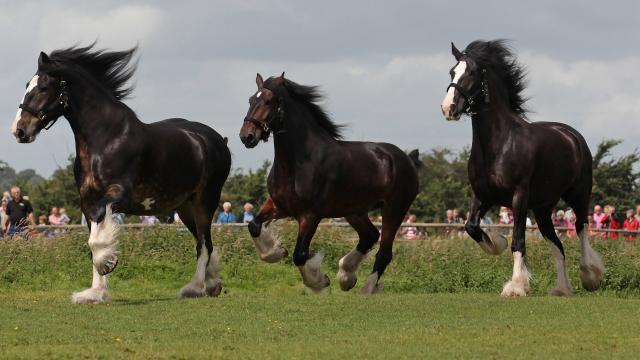When horses are happy, they snort, according to new research published today in PLoS One. The finding could help improve treatment of these domesticated animals, the authors say.
The snorts are just as cute as I had hoped. Take a listen:
The research comes from scientists at the University of Rennes in France, who noticed that horses tend to snort when they’re moved into better living conditions, such as large pastures with a lot of food.
“There are three important things for horses. They’re very special animals,” Alban Lemasson, an ethologist from the University of Rennes and co-author on the new study, told Gizmodo.
“Being isolated for a long time is not something they like — they are social. They also like to graze for long hours, not three discrete meals a day. And they like to walk around a lot outdoors. Tiny stalls for long hours are not great for them.”
So, in favourable conditions — outside in a big pasture, with friends, grazing all day — horses should theoretically be snorting more as a sign of happiness. The researchers decided to test their hypothesis by counting the snorts of horses in various settings.
The team, led by ethology PhD student Mathilde Stomp from the University of Rennes, observed 48 horses across three different settings: Horses that lived in two riding schools and spent varying blocks of time in stalls and pastures, and one “naturalistic” group of horses that always roamed in pastures.
They kept track how often the horses snorted in the different settings, and also how often horses showed other behaviours that would indicate their mood and overall well-being.
For example, if a horse’s ears are pointed backward, they’re communicating discomfort or pain — forward or sideways ears, on the other hand, communicate positive emotions. Also, horses that face the walls of their stalls or act aggressively toward humans are not happy horses, as you might guess.
Stomp and her colleagues used these observations to calculate each horse’s chronic stress score, a measure of how disturbed an animal is, and compared the score to how often they snorted.
The less stressed a horse was, the more it snorted — and indeed, the horses in naturalistic settings, free to socialise, roam and graze, snorted much more than the horses housed in riding schools.
Additionally, snorts did not differ between horses of different sexes or ages, and horses snorted as much as 10 times more often when moved into a pasture with new food sources.
The authors also wrote in their paper that the horses probably aren’t snorting to clear dust from their noses, because stalls are much dustier than pastures.
Still, Stomp said she wants to replicate the study to know for sure that snorting is truly tied to positive emotion. And though the study took place only in France, Stomp said the results should be applicable to horses all over the world.
At least one ethologist not involved in the work agreed with its conclusion.
“This is a really easy indicator that everyone can make note of,” Katrina Merkies, ethologist at the University of Guelph, told Gizmodo. By being more aware of the different situations in which a horse snorts, she said, we can we can put them in those situations more often.
“By doing that, we can promote better welfare for our animals.”
And this snort finding is only the beginning — other non-vocal sounds could be signs of emotion in horses. While vocal horse sounds, such as neighs and whinnies, have been studied to an extent, non-vocal sounds are pretty much uncharted territory, Merkies said.
Stomp said she’d now like to study other non-vocal sounds, such as blows: Smoother, uninterrupted exhales that are sometimes conflated with snorts, but instead indicate a horse is feeling threatened or alarmed.
More work could clear up what these different non-vocal sounds mean for a horse’s mood, which could prove crucial to providing horses with the best living conditions possible.
“When we assess stress and welfare in animals, we tend to look at the negative, because it’s easy to measure,” Merkies said, such as monitoring heart rates and levels of the stress hormone cortisol. But providing the bare minimum isn’t enough, she continued.
“We need to do more than just provide an animal with what it needs to live — we need to provide them with a life worth living. And if we can measure that, [a life worth living] is a lot easier to provide.”
[PLOS ONE]
